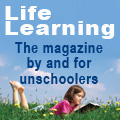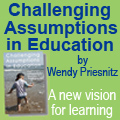Where Does Spontaneity Go?
By Wendy Priesnitz
 Spontaneity is one of the great strengths of little children; they live in the moment, following their curiosity, darting here and there, picking things up and putting them down, trying, exploring, laughing, playing. Play is something that children know how to do very well…if only adults who have forgotten how can stop interfering with their freedom to play spontaneously. Spontaneity is one of the great strengths of little children; they live in the moment, following their curiosity, darting here and there, picking things up and putting them down, trying, exploring, laughing, playing. Play is something that children know how to do very well…if only adults who have forgotten how can stop interfering with their freedom to play spontaneously.
Many parents are scared of spontaneity. Or, rather, they mistrust their children’s ability to regulate their own time and do not recognize the value of unstructured play. School definitely frowns on spontaneity, as do many so-called recreational pursuits – especially those of the organized team variety.
Spontaneity also dies when we develop the compulsion to do things perfectly. Although some personalities have that tendency, I think it is also encouraged, if not created, by results-based schooling (and parenting). Somewhere along the way, I lost the ability to be spontaneous because I needed to please my parents by being a quiet and “lady-like” child, to please my teachers by being invisible except when called upon, and to please both sets of adults by getting high marks. So I learned not to take chances and only to do things I was sure I could do well.
Spontaneity sometimes dies when we train people to become experts or “professionals.” Fortunately, my family didn’t have enough money to give me lessons in things like drawing, singing, playing the piano – or, more importantly, in writing. Nor did they value those aspects of life or think I was particularly talented in them, let alone apt to become a professional. So I wasn’t inhibited about my scribblings because nobody defined what was good or bad, or told me I belonged in the audience because I couldn’t attain perfection. So I played with words. And that play helped me develop my creativity. And because nobody expected me to be perfect, I was able to retain the ability to play, explore, experiment, be spontaneous…at least with writing.
A good friend of mine, on the other hand, learned how the road to perfection is littered with landmines waiting to kill the joy of creativity and spontaneity. He had fun noodling around on the piano. Somebody thought he might “make something” of his apparent talent if he was “serious enough” about doing so. So he had to stop playing, get a teacher, and start practicing. A rigorous schedule was followed, there were competitions to take part it, always on the road to the holy grail of perfection. He turned out not to be one of those talented exceptions eager to hone their special skills; the joy and spontaneity of play fled as quickly as playing the piano became goal-oriented.
How sad to be taught that learning is work, that trial and error is inefficient, that there is something wrong with the joy of discovery and creation, that the only valid pursuits in life are those done for reward or for other people’s reactions. He doesn’t play the piano now.
Like anything else that is abused, avoided, or underused, spontaneity withers away. We become shy and inhibited about trying new things, about expressing ourselves spontaneously. And that is unfortunate, since spontaneity is one of the components of creativity, something that we can all use more of in our personal and working lives. In fact, says the late child development specialist, experimental educator, and author James L. Hymes Jr, “Play builds the kind of free-and-easy, try-it-out, do-it-yourself character that our future needs.”
Wendy Priesnitz is Child's Play Magazine's founder and editor. She is the author of 13 books and has been a journalist for over 40 years.
Copyright © Life Media
Privacy Policy
 



|

